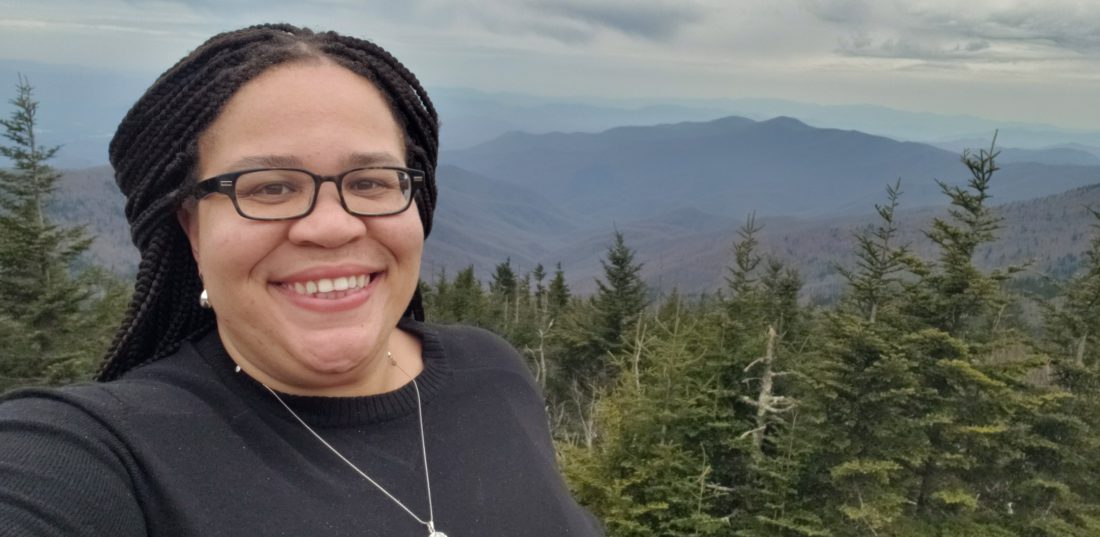Growing up in Spartanburg, S.C., back when “it didn’t have a vibrant downtown,” the goal for award-winning writer Latria Graham was just to get out. She did, attending Dartmouth College before completing an MFA in Creative Nonfiction from The New School in New York City and going on to win multiple awards for sportswriting and journalism.
Graham returned to Spartanburg in 2013 to care for her ailing father and stayed because she had established contacts in the New York publishing world and realized she could work from anywhere. “If you told me at 25 I’d be back in South Carolina, I’d be like, ‘There’s no way,’” she says. “But the area has grown, and I’ve grown as a person. … I’m interviewing people [who are] sometimes in their 70s and 80s, [so] I feel like I really am, at times, capturing the last of a way of life.”
Graham will speak at a Mountain of Words art and literary event presented by Word on the Street/ La Voz de los Jovenes, a bilingual online arts and culture magazine created by young artists. Graham describes Word on the Street (under the Asheville Writers in the School and Community umbrella) as “a brilliant program I wish had been around when I was a teen.” She’ll be joined at the Saturday, Nov. 23, reading and discussion by author and editor Juan G. Sánchez Martínez, a UNC Asheville professor originally from Colombia; and spoken-word artist Cara Forbes, an enrolled member of the Eastern Band of Cherokee Indians.
“My goal is to be the adult I needed,” Graham says. She plans to introduce her talk with the story of how she paid for Dartmouth in watermelons: “I had a pretty good scholarship, but I needed food and clothes,” she says. “So my dad set up his pickup truck and filled it with watermelons, and he was like, ‘Everything you make, I’ll match.’”
As customers requested more and more produce, Graham’s family reopened their farm. Some in her hometown see her only as the farmer’s daughter, she says, but those roots have given her perspective on the role of nonwhite people in Southern foodways — one of the exigent topics she addresses. “America breaks my heart a little bit with every story I write,” she admits. But, “I write [for my family] to be able to say we were here.”
Graham is attracted to challenging subjects because “I want to understand them,” she says. She’s covered the water crisis in Flint, Mich., and the Dakota Access Pipeline protests. While in college, she began exploring her personal experience as a woman of color with an eating disorder, “writing back against the idea that black women don’t have them, [because] if I can help someone else suffer less, then I’ve done something.”
Working in both journalism and creative nonfiction, she notes that rule No. 1 for reporting is “I don’t appear in the piece” in order to remain objective. But there are times for breaking that rule, such as a story that will appear in Oxford American’s South Carolina music issue, for which Graham visited singer/actor Eartha Kitt’s hometown. Graham’s light complexion parallels Kitt’s experience as a person of mixed race: “The editor said, ‘There’s something missing,’ [so] I had to appear in it because it gives you some sense of the isolation [Kitt] faced.”
One piece of advice Graham shares with fellow writers is the importance of support systems. Especially for a freelance writer, “This job will kill you — the pressure is on you as a sole proprietor,” she says. “When you isolate yourself, you lose the sense of the importance of the work.” Graham relies on feedback from her family as well as an online network.
Social media can help, too: Through Twitter, Graham discovered other writers sharing work in process and building their personas and brands. Growing up, she admits, she had focused on playing clarinet because, although she loved books, she didn’t consider literature a viable career. “We were reading Edgar Allan Poe and Nathaniel Hawthorne. When we did read women, it was Emily Dickinson. They were dead white people [who] all became famous after they were dead,” she says. “I was like, ‘I don’t have time for that. … I have to be able to [make a living].’”
When Graham did find her way to a career in writing, she realized it was not only financially viable, but an important platform for underrepresented stories — a message she hopes to share with the students of Word on the Street and the larger literary community.
WHO: Latria Graham, Juan G. Sánchez Martínez and Cara Forbes read from and discuss their writing for Mountain of Words
WHERE: YMI Cultural Center, 20-44 Eagle St. ashevillewritersintheschools.org
WHEN: Saturday, Nov. 23, 6-9 p.m. Free




Before you comment
The comments section is here to provide a platform for civil dialogue on the issues we face together as a local community. Xpress is committed to offering this platform for all voices, but when the tone of the discussion gets nasty or strays off topic, we believe many people choose not to participate. Xpress editors are determined to moderate comments to ensure a constructive interchange is maintained. All comments judged not to be in keeping with the spirit of civil discourse will be removed and repeat violators will be banned. See here for our terms of service. Thank you for being part of this effort to promote respectful discussion.